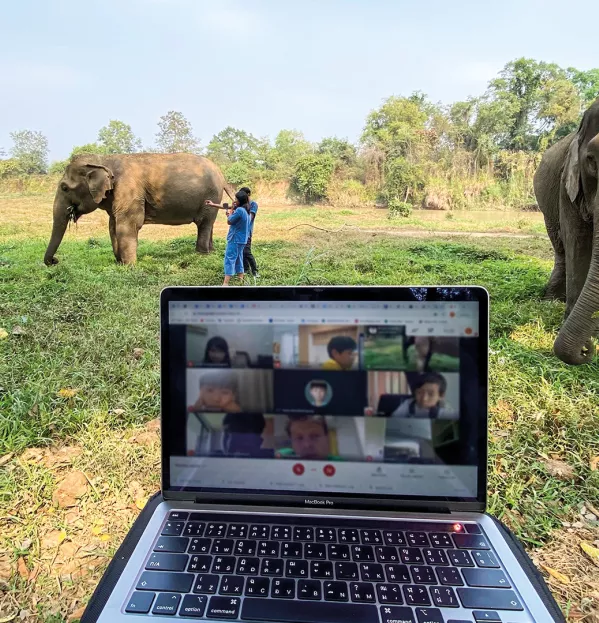It was one of the more eye-catching emails I received while teaching online: “Would your pupils like to meet our elephants?”
I was keen to read on. It was from the Golden Triangle Asian Elephant Foundation (GTAEF), a conservation group that runs an elephant sanctuary at a remote point where the borders between Thailand, Myanmar and Laos meet.
They explained that their usual business of offering “elephant experiences” to tourists had seen few visitors after the pandemic so they were hosting a remote version and wondered if we were interested.
Our school is lucky enough to have two environmental sustainability coordinators: me and my colleague, Susan Whalley. We work to integrate environmental education into the school’s provision and the idea of a virtual field trip to meet Asian elephants, which are categorised as endangered, was a perfect fit. So, the answer was an obvious “yes” - and we decided to trial it with Years 1 and 4.
Before the day itself, each class teacher held an online introductory lesson, where pupils learned about the work of GTAEF and the impact of the pandemic on its activities.
This introduction gave the learning a real-world context and highlighted wider impacts of the pandemic that the children might not have thought about before.
A virtual school trip to see the elephants
From this, Year 4 pupils created questions to ask the experts in preparation for their online excursion.
Meanwhile, Year 1s made “toilet-roll binoculars” and prepared safari costumes to wear on the day. They also thought about the questions they might want to ask when they saw the elephants.
We held the online visits separately for the two groups, enabling the presenters at GTAEF to pitch their talks to the differing classes. Each session lasted 30 minutes and held 40 to 60 children (two to three classes at a time).
With pupils logged in from home, we were greeted by presenter Laddawan Yonthantham. Armed with a laptop, smartphone and selfie stick, she started off with an informative introduction before heading into the grassland in search of elephants. You can imagine the joy on the children’s faces when they first spotted the animals - there were lots of smiles, laughter and emoji in the live chat. The questions immediately flooded in and it was wonderful to see pupils so engaged.
It was a magical experience for teachers and children alike, especially when we saw a group of elephants bathing in the river suddenly rush on to the banks, trumpeting and chasing after one another.
Since those two trial groups, all year groups have had the same remote experience. Now, some 970 pupils and their teachers - everyone from foundation stage to Year 6 - have been on a virtual elephant safari.
During the challenging times of teaching during the pandemic, it was great to have a common school-wide theme that every pupil could connect with.
Overall, the success of the partnership shows that we can always find new and innovative ways to engage pupils in experiences that boost learning and help them learn about the wider world.
Ewen McLeish is a teacher and environmental sustainability coordinator at St Andrews International School, Bangkok. The GTAEF continues to offer virtual field trips to schools worldwide, including those within the UK’s time zone
This article originally appeared in the 8 October 2021 issue under the headline “Taken to tusk over wildlife conservation.”




